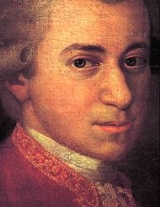
Wolfgang Amadeus Mozart (ˈvɔlfɡaŋ amaˈdeus ˈmoːtsaʁt, English see fn.), baptismal name Johannes Chrysostomus Wolfgangus Theophilus Mozart (27 January 1756 – 5 December 1791), was a prolific and influential composer of the Classical era
. He composed over 600 works
, many acknowledged as pinnacles of symphonic
, concertante
, chamber
, piano, operatic, and choral
music. He is among the most enduringly popular of classical
composers.
Mozart showed prodigious ability from his earliest childhood in Salzburg
.
If Germany, my beloved fatherland, of whom you know I am proud, will not accept me, then must I, in the name of God, again make France or England richer by one capable German; — and to the shame of the German nation.![]()
The most stimulating and encouraging thought is that you, dearest father, and my dear sister, are well, that I am an honest German, and that if I am not always permitted to talk I can think what I please; but that is all.![]()
A fellow of mediocre talent will remain a mediocrity, whether he travels or not; but one of superior talent (which without impiety I cannot deny that I possess) will go to seed if he always remains in the same place.![]()
As I love Mannheim|Mannheim, Mannheim loves me.![]()
My fatherland has always the first claim on me.![]()
I care very little for Salzburg|Salzburg and not at all for the Hieronymus Graf von Colloredo|archbishop: I shit on both of them. ![]()

